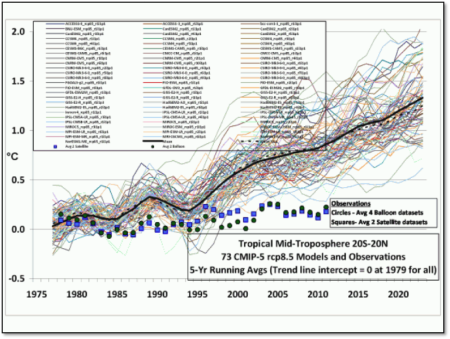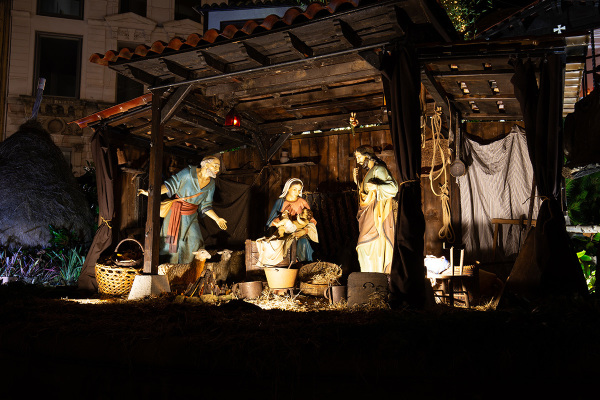Fossil Fuels, Enemy or Friend? Divine Design in the Carbon Cycle

Further, the models utterly failed to predict the complete absence of statistically significant warming for the past 16 to 23 years (depending on what dataset one trusts).
Both failures by the models indicate that the assumption of strong net positive feedbacks in the climate system is wrong. This is why many climatologists are reassessing "climate sensitivity," that is, how much the planet will warm, after feedbacks, in response to doubled atmospheric CO2 concentration. New estimates range from about 0.3°C to about 2–2.5°C, the former actually concluding that overall feedbacks are negative, and the latter that though positive they are far weaker than previously thought.
I'll conclude by turning from the scientific to the theological focus of Jenkins's article. In contesting my belief, based in part on the parable of the talents, God intends us to use fossil fuels to human benefit, he writes, "One must be careful when ascribing intent to God, especially when the claim appears to run counter to His design."
I agree wholeheartedly! But I'm not convinced that, with regard to fossil fuels, he's discerned God's intent or God's design better than I have.
He says that part of God's
… design is the carbon cycle, a miraculous process by which trees and other plants, animals, people, and the ocean remove carbon dioxide from the atmosphere and transfer it into the ground where the excess is sequestered. This is how the proper balance of carbon dioxide in our atmosphere is maintained. The intended resting place for a significant amount of that excess carbon is deep underground in the form of oil and coal.
Ignore for the moment the mistake of saying "animals, and people … remove carbon dioxide from the atmosphere." They do the opposite. Ignore also that he simply assumes but does not prove "the proper balance of carbon dioxide in our atmosphere"; many biologists consider earth's vegetation starved for carbon dioxide, and paleoclimate studies show conclusively that in the past the atmosphere has had many times more CO2 in it and that plants grew much better (and thus animals ate much better) because of it. Indeed, a recent study has concluded that improvements in crop yields because of rising atmospheric CO2 concentration have added about $3.2 trillion worth of food to the world in the past half century and will add about $9.8 trillion worth in the next. These scientific errors are not my focus now.
Rather, I want to ask three—okay, four—questions: Has he rightly described the "carbon cycle"? Has he rightly identified the "intended resting place for a significant amount of that excess [And how, incidentally, does he know it's excess?] Carbon " as "deep in the ground"? And does his vision really better fit "God's design" than an alternative one?
And here are my answers:
No, he doesn't rightly describe the "carbon cycle." Rather, he describes a carbon dead end—a one-way street, into the ground. As the hydrologic cycle has water falling in precipitation, evaporating, condensing into clouds, and falling again in precipitation, a true carbon cycle would have carbon going down and back up again.
No, he hasn't rightly identified the "intended resting place for a significant amount of … carbon"—or rather, at least, he hasn't given us any particular reason to think deep underground is God's intended resting place for it. (Neither does he know it's "excess"; that's the very point in debate about anthropogenic global warming. We certainly know that plants do much better with more CO2 in the air; we don't know more CO2 will cause counterbalancing catastrophic results.)
No, his vision doesn't better fit God's design than an alternative one: a vision of the true carbon cycle. Here's that vision:
Energy from fossil fuels—whose energy density is vastly greater than that of wind, solar, wood, dung, or biofuels, and therefore vastly more affordable—has been one of the key instruments by which such great strides in human wellbeing have been achieved. Quite literally, these fuels have been crucial to the vast increase of human life—in both numbers (from perhaps half a billion in 1700 to perhaps 7 billion today) and longevity. And they've also benefited the rest of the biosphere, as environmental economist Indur Goklany points out: "By lowering humanity's reliance on living nature [wood for heat, feed for animals for transportation and other work], fossil fuels not only saved humanity from nature's whims, but nature from humanity's demands."
How did the fossil fuels get where they are? They are the remains of trillions of dead plants and animals, buried under vast layers of sedimentary rock and transformed by heat and pressure into coal, oil, and natural gas. Many young-Earth geologists think they died and were buried in the universal flood of Noah's time, when God's judgment on man's sin led to His wiping out almost all life on Earth. Whether that is so, I leave for discussion at some other time. The fact is that they died and were buried. All (but the humans) were innocent. They were not sinners. They bore God's judgment on a sin not their own.
They died. They were buried. And now they are being lifted out of the ground and transformed from matter into energy, leaving a gas, carbon dioxide, as a byproduct. Carbon dioxide is essential to all life. Plants use it in photosynthesis, and the higher its concentration, the better they grow. For every doubling of CO2 concentration in the atmosphere there is, on average, a 35 percent increase in plant growth efficiency. Since all other life depends on plants for food—either directly or indirectly—this boon to plants is a boon to the rest of life, too. The increase in atmospheric CO2 concentration over the past sixty years or so seems likely to account for some 12 to 15 percent of the increase in average crop yields per acre during that period—contributing some $3.2 trillion worth of food, helping the poor more than anyone else.
Stop and think for a moment: Innocent creatures die, are buried, are brought up out of the ground, and bring life to others. Haven't you heard that story before?
Of course you have. It is the basic summary of the gospel: Christ (who knew no sin but became sin for us that we might be made the righteousness of God in Him; 2 Corinthians 5:21), died for our sins according to the Scriptures; He was buried; He rose again from the dead on the third day according to the Scriptures. At death the human body "is sown a natural body; it is raised a spiritual body. If there is a natural body, there is also a spiritual body. Thus it is written, 'The first man Adam became a living being'; the last Adam became a life-giving spirit" (1 Corinthians 15:3–4, 44–45).
Rather than seeing fossil fuels as permanent carbon sequestration, we see them, when transformed into energy, as both literally giving life—long and healthy life—to billions of human beings who are not carbon footprints but the footprints of carbon, on the one hand, and, on the other hand, beautifully picturing the death, burial, and resurrection of our Lord and Savior Jesus Christ.
May we think not of the carbon dead end (Jenkins's vision) but of the carbon life cycle? Why, if we recognize and celebrate the beautiful design of the water cycle, ought we not also to celebrate the beautiful design of the carbon cycle? And might I even venture that this could be one way in which the Book of Creation points to the gospel in the Book of Scripture, and that by embracing this understanding we might not only bring enormous benefit to human health and prosperity to the world's poor but also increase our effectiveness in reaching some of its lost and dying people?





















